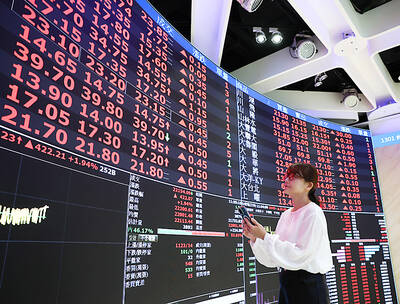Motorola (China) Electronics Ltd said yesterday it wanted to turn Asian handset users, including 700 million Chinese, into active banking customers through its “mobile wallet” idea.
“If we can have these people pay their utility bills via their mobile wallets, imagine the business activities that could be created for banks, vendors and telecommunication operators,” said T.K. Ng (吳達光), a Motorola (China) Electronics executive.
Without disturbing the vendor portals or cellphone models and subscriber identity module (SIM) cards now available in the marketplace or vendor portals, Motorola’s mobile wallet uses technology similar to that in credit cards on a tiny film that is half the size of a regular SIM card.
Speaking ahead of the company’s Mobile Wallet World 2009 conference, which opens today, Ng said the i-SIM near field communication (NFC) Lite card, designed to attach to regular SIM cards to create instant financial services, will be rolled out in Taiwan or China by the end of this year.
“Taiwan is the best testing ground for this type of technology because it is a country that is very receptive to new technologies and a successful roll-out in Taiwan will give more impetus for Chinese consumers to try it out,” he said.
The i-SIM NFC Lite card can integrate various types of cash cards, such as Taipei’s Easy Card (悠遊卡), gift, debit and credit cards, into a single platform to facilitate transactions, company executives said. The mobile wallet will also be able to register VIP cards and point collection cards at shops for discounts and promotional offers.
“With a simple swipe of the cellphone, discounts can be applied, reward points can be collected and gift cards can be used, all simultaneously,” Ng said.
“As with any technology, there will be initial and continuous safety issues that new businesses will perhaps have to solve,” Ng said, referring to possible security issues arising from hackers targeting cellphones.

UNCERTAINTIES: Exports surged 34.1% and private investment grew 7.03% to outpace expectations in the first half, although US tariffs could stall momentum The Chung-Hua Institution for Economic Research (CIER, 中華經濟研究院) yesterday raised its GDP growth forecast to 3.05 percent this year on a robust first-half performance, but warned that US tariff threats and external uncertainty could stall momentum in the second half of the year. “The first half proved exceptionally strong, allowing room for optimism,” CIER president Lien Hsien-ming (連賢明) said. “But the growth momentum may slow moving forward due to US tariffs.” The tariff threat poses definite downside risks, although the scale of the impact remains unclear given the unpredictability of US President Donald Trump’s policies, Lien said. Despite the headwinds, Taiwan is likely

When Lika Megreladze was a child, life in her native western Georgian region of Guria revolved around tea. Her mother worked for decades as a scientist at the Soviet Union’s Institute of Tea and Subtropical Crops in the village of Anaseuli, Georgia, perfecting cultivation methods for a Georgian tea industry that supplied the bulk of the vast communist state’s brews. “When I was a child, this was only my mum’s workplace. Only later I realized that it was something big,” she said. Now, the institute lies abandoned. Yellowed papers are strewn around its decaying corridors, and a statue of Soviet founder Vladimir Lenin

READY TO BUY: Shortly after Nvidia announced the approval, Chinese firms scrambled to order the H20 GPUs, which the company must send to the US government for approval Nvidia Corp chief executive officer Jensen Huang (黃仁勳) late on Monday said the technology giant has won approval from US President Donald Trump’s administration to sell its advanced H20 graphics processing units (GPUs) used to develop artificial intelligence (AI) to China. The news came in a company blog post late on Monday and Huang also spoke about the coup on China’s state-run China Global Television Network in remarks shown on X. “The US government has assured Nvidia that licenses will be granted, and Nvidia hopes to start deliveries soon,” the post said. “Today, I’m announcing that the US government has approved for us

The National Stabilization Fund (NSF, 國安基金) is to continue supporting local shares, as uncertainties in international politics and the economy could affect Taiwanese industries’ global deployment and corporate profits, as well as affect stock movement and investor confidence, the Ministry of Finance said in a statement yesterday. The NT$500 billion (US$17.1 billion) fund would remain active in the stock market as the US’ tariff measures have not yet been fully finalized, which would drive international capital flows and global supply chain restructuring, the ministry said after the a meeting of the fund’s steering committee. Along with ongoing geopolitical risks and an unfavorable